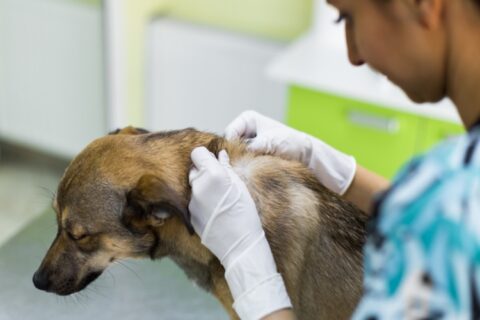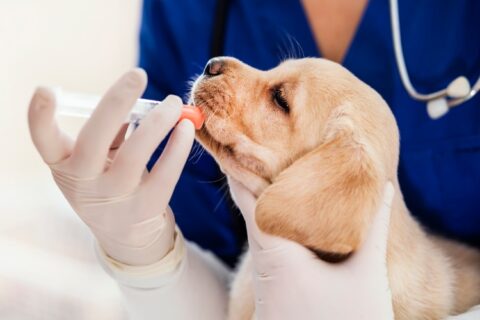Cancer Warning Signs in Dogs
Early detection of cancer is important for successful treatment. Signs of cancer in dogs are often hard to detect. Sometimes it can’t even be detected through blood work. Being aware of these ten signs can help protect your dog’s health. Even if these signs don’t turn out to be cancer, paying attention to your dog’s symptoms can help you catch other medical conditions that need veterinary attention. Since dogs often don’t show exterior signs of interior trouble, pets should see a veterinarian on a regular basis. In addition to checkups, look for these symptoms:
- Abnormal swellings can be a sign of trouble. Lumps and bumps that continue to grow under the skin should be tested to see if surgical removal is necessary and a biopsy is recommended. Make sure you show abnormal lumps and bumps to your veterinarian so he/she can determine whether it’s malignant or benign, and discuss if there are any necessary next steps.
- Sores that don’t heal are a red flag. If antibiotics have been given by mouth or applied by ointment and a sore isn’t healing, seek veterinary care.
- Unexplained weight loss warrants attention. If your dog is losing weight and isn’t on a weight-loss diet, it can be a sign of a tumor or other health issue.
- Lost appetite can also be a sign of cancer or other health issues. If your dog won’t eat, a vet trip is warranted as it can be a sign of an internal mass or other medical issue.
- If your dog has trouble eating or swallowing, seek medical treatment. This could possibly be caused by a lump in the neck that’s putting pressure on the esophagus.
- Bleeding or discharge is not a good sign. Bleeding from any bodily opening is alarming. You should consult your veterinarian. Dark or blood in your animal’s urine or stool is a medical issue and can be a sign of cancer.
- An offensive odor can mean cancer. Sometimes it comes from a mass draining pus, which can contain bacteria.
- If your dog doesn’t want to exercise or can’t keep up. A change in normal activity level could be a sign of a tumor which can make it very difficult to exercise. Even if it is not cancer, the change in activity level can be a sign of other illness.
- A persistent stiffness or lameness can spell trouble. A lame pet is not necessarily a sign of cancer. Although, cancers can cause pain, lameness, and swelling.
- If your dog is having difficulty breathing, urinating, or defecating, it’s important to seek veterinary care as soon as possible. A mass may be putting pressure on the respiratory system, urinary system, or digestive system.
When your animals are sick, trust Reed Animal Hospital. We treat your pets as if they were our own. Our goal is to help you and your pet enjoy a healthy, fulfilling life together. In the pursuit of that goal, our extraordinary team offers a wide range of services. We have veterinarians, technicians, assistants, and receptionists, all prepared to help you and your pet. We even offer referrals to specialty surgeons, many of whom will travel to our office for a consultation with you and your pet. For more information or to make an appointment, call us in Campbell at 408-369-1788, in Saratoga at 408-647-2906, or contact us through our website.


